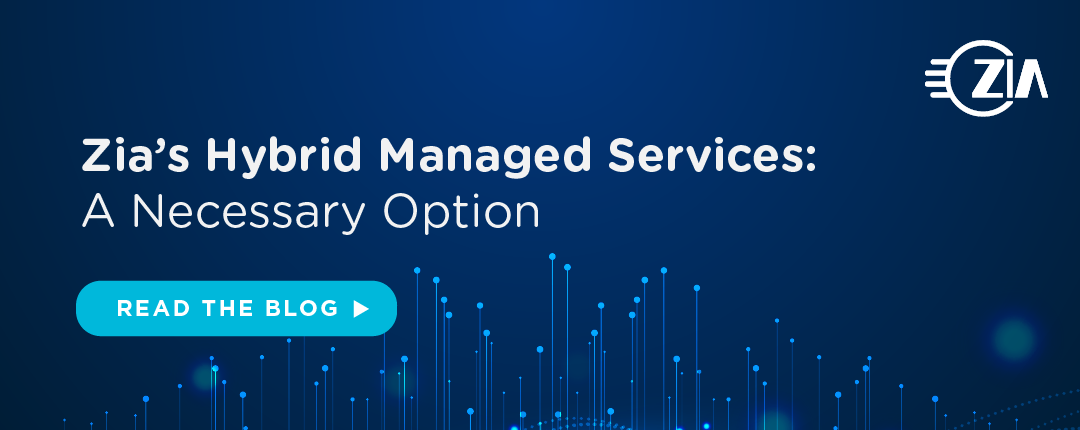In today’s fast-paced and ever-evolving technological landscape, businesses face numerous challenges in managing their IT infrastructure. Hybrid managed services, like those offered by Zia, are a necessary option to address these challenges. They provide a blend of on-premises and cloud-based solutions. There are several things to consider with finding the right solution:
The Reality of Scaling Unstructured Data Automation
The unstructured data automation market continues to innovate rapidly. However, scaling these technologies globally presents unique challenges. What works perfectly in labs often requires significant revisions in real-world applications. Mass adoption takes longer than anticipated, resulting in skepticism around growth projections that are crucial in distinguishing genuine advancements from hype.
The Cloud vs. On-Premises Reality
Despite the widespread belief that everything would move to the cloud by now, the reality is different. A 2021 survey by Spiceworks revealed that 98% of enterprises still rely on on-premises infrastructures. Major cloud vendors acknowledge that only around 10% of enterprise computing is in the cloud. This indicates that more applications and data remain on-premises than many vendors admit, highlighting the enduring importance of legacy systems.
The Challenge of Integrating New Technologies
Real-world integrations are complex. Enterprises deal with thousands of applications and data silos, many of which are on-premises legacy systems. These systems, while often labeled negatively, have been performing their tasks effectively for decades. The challenge lies in integrating new technologies without disrupting established processes.
Successes in Unstructured Data Automation
While automating simple tasks can be quick, reengineering entire business processes is slow and complex, requiring detailed analysis and careful integration. This cautious approach is essential to manage risks and ensure smooth transitions.
Embracing Legacy Systems
It’s time to move beyond the “everything is moving to the cloud” narrative. Evidence shows that on-premises systems will remain crucial for the foreseeable future. Legacy systems should be valued for their reliability and effectiveness. Innovations in AI and Generative AI are transformative, but broad adoption takes time. A balanced perspective is necessary to navigate the complexities of implementing new technologies within established enterprise systems.
Zia embraces a multi-prong approach which includes enhancing existing systems, as well as incorporating hybrid and cloud native strategies, to avoid disruptive overhauls. We help curate a sensible strategy and roadmap for each customer based on your unique use cases, processes, and application age and life expectancy that includes your desired outcomes and state. A balanced perspective is necessary to navigate the complexities of implementing new technologies within established enterprise systems. Here’s a few reasons that hybrid managed services are essential for modern enterprises:
1. Adapting to Diverse Workloads and Needs
Businesses often have diverse IT workloads that vary in complexity, sensitivity, and resource requirements. Hybrid managed services allow organizations to adapt to these varying needs efficiently:
- Sensitive Data and Applications: On-premise solutions can offer more control for mission-critical applications when scaling requirements are known.
- Scalable and Flexible Workloads: Cloud solutions provide the scalability and flexibility required for fluctuating workloads and rapid growth.
2. Balancing Cost and Performance
Cost management is a significant concern for organizations of all sizes. Hybrid managed services help balance cost and performance by leveraging the strengths of both on-premises and cloud environments:
- Cost Efficiency: Reduce capital expenditures by utilizing cloud services for scalable needs while maintaining steady workloads on-premise.
- Performance Optimization: Deploy applications in the environment best suited to their performance requirements, ensuring optimal resource utilization.
3. Enhanced Security and Compliance
Security and regulatory compliance are paramount for many industries. Hybrid managed services provide a robust framework to address these concerns:
- Data Sovereignty: Keep sensitive data on-premise (and in private cloud tenants) to meet regulatory requirements and ensure data sovereignty.
- Comprehensive Security: Implement advanced security measures across both environments, including encryption, multi-factor authentication, and continuous monitoring.
4. Ensuring Business Continuity and Resilience
Business continuity and disaster recovery are critical for maintaining operations during disruptions. Hybrid managed services enhance an organization’s resilience by:
- Redundancy and Backup: Utilize cloud resources for redundancy and backup, ensuring quick recovery from failures or disasters.
- Minimized Downtime: Distribute critical services across multiple environments to reduce the risk of downtime and maintain service availability.
5. Facilitating Digital Transformation
Digital transformation initiatives often require a mix of legacy systems and modern technologies. Hybrid managed services facilitate this transition by:
- Integrating Legacy Systems: Seamlessly integrate existing on-premises systems with new cloud-based solutions, preserving investments in legacy infrastructure.
- Supporting Innovation: Enable the adoption of innovative technologies like AI, machine learning, and advanced analytics without disrupting existing operations.
Hybrid managed services are not just an option but a necessity for businesses during their modernization journey. They offer a strategic approach to managing IT infrastructure, balancing cost, performance, security, and continuity. By leveraging the best of both on-premises and cloud environments, hybrid managed services enable organizations to remain agile, resilient, and competitive in a rapidly changing technological landscape. Reach out to us to talk about your specific needs and strategy.

ABOUT THE AUTHOR
Mike Mahon, President & CEO
Mike is a technology solutions entrepreneur with more than 25 years of content management experience in numerous verticals. He has proven to be highly effective at developing business units, software teams, and sales teams into high-performing entities. In 2022, Mike was inducted into the Colorado Titan 100 Hall of Fame after being recognized as a Titan for 3 consecutive years. As a Titan 100, he is known to be one of Colorado’s most accomplished business leaders, demonstrating exceptional leadership, vision, and passion. Mike sits on the Titan 100 CEO Board of Advisors, is a board member of the Colorado Thought Leaders Forum (CTLF), and participates in the Inc. 5000 Masters Group. These positions allow him to elevate business leaders and help them move from success to significance in their personal and professional lives. When he isn’t working, you’ll find Mike reading, coaching, mentoring, skiing, mountain biking, or throwing axes.

